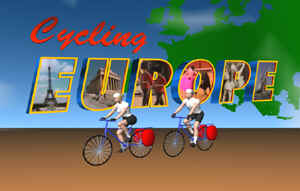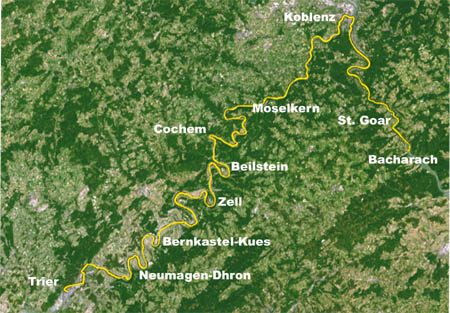![]()


Cycling
the Mosel & Rhine Valleys
Germany is a country which not only
enjoys fine automobiles and fast roads; but also has taken great care to provide
a fine network of cycle routes and dedicated cycle paths for the large number of
bicycle riders of all ages.
The Mosel River starts in the Vosges Mountains of France as the Moselle and
meanders past Luxembourg into Germany, emptying into the Rhine. The Rhine
River begins in Swiss Alps, forms a border with Austria until Lake Constance,
flows between Germany and France, and empties into the Atlantic Ocean in the
Netherlands. Our cycling tour focuses on the region between Trier and Koblenz on
the Mosel and from Koblenz to Bacharach on the Rhine.
Of special interest to travelers is that this region has a very high
concentration of Castles, or “Burgs”. Until the eighteenth century, rivers were
the main routes of travel and the Burgs were tariff collection points by
sometimes unscrupulous landowners. Their spectacular mansions dot the banks of
these rivers, in a display of the best achievements of German gothic
architecture. The region is also known for its Roman history and a wine industry
that dates to the Roman times.
We arrived at Frankfurt Flughafen (airport) and had booked a reasonable hotel in
the nearby town of Mörfelden-Walldorf. There was a bus every half hour between
the airport and the hotel. And we were able to load all three bicycles on the
bus. The next morning, we’re back at the Flughafen, but this time, we’re
connecting by train to our starting point in Trier. Fortunately for cyclists,
German Rail or “Deutches Bahn” is one of the most cycle-friendly in Europe.
There is almost hourly train service to Trier, and it basically follows our
cycling course along the Rhine and Mosel. This raised our excitement level as
we watched the beautiful scenery from the train window.
Trier is Germany’s oldest city, with a history that dates back to days before
the ancient Roman Empire. From the Porta Nigra, the main city gate, it's a short
stroll to the Hauptmarkt; in a classic square. Nearby is the Cathedral and a
further stroll brings you to the ruins of the Roman ampatheater, as well as
other Roman ruins.
The 1st Stage begins in Trier and immediately heads across the Mosel River
through Pfalzel and Schweich and crossing back to the south bank for a scenic
ride around two river bends; ending in Neumagen-Dhron, a comfortable, leisurely
43 km ride. Neumagen-Dhron is actually two towns: Neumagen and Dhron. Roman
winemakers discovered this area two thousand years ago. And it’s been known for
great wines ever since. We picked a very bicycle friendly place to stay, which
is right across from the Mosel and we found it very relaxing to sit in the park
in front of our hotel and watch the river flow by.
The 2nd Stage takes us to the Left Bank of the Mosel, through Piesport, then
back to the Right Bank and through Wintrich and Mülheim to another hyphenated
pair of towns, Bernkastel-Kues, a brief 25 km ride. We catch our 1st glimpse of
the ruined castle up on the hill, as we approach Bernkastel. It's a nice walk
uphill for about 20 minutes from town to the ruins. From this height, you can
watch the river traffic and really get a perspective of how the Mosel twists
itself around. A stop in Bernkastel wouldn't be complete without a visit to the
main square, its fountain surrounded by half timbered buildings.
Our 3rd Stage departs Bernkastel, and follows the right bank of the Mosel
through Traben-Trarbach, ending in Zell, a 42 km ride. Zell is a lively little
market town, made famous by its special brand of Mosel wine: “Zeller Schwartz
Katz”, Black Cat Wine. You can taste for yourself. Hike up the hillside for
another spectacular view of the river and town below.
The 4th Stage goes from Zell, through Bullay, crosses to the Left Bank at Neef,
winds around through Eideger-Eller, crosses back to the Right Bank of the Mosel
into Senheim, then continues through Mesenich into Beilstein, a 27 km ride.
Beilstein is one of the quietest stops on the tour. Burg Metternich is on the
hill and deserves the climb for another spectacular view of the town below and
the ferry crossing.
The 5th Stage follows the Right Bank and crosses back over the Mosel into Cochem,
a short 11 km, practically a day off. Cochem is one of Germany’s best preserved
Medieval towns. From the furnished Reichsburg castle on top of the hill, you
can get an impression of life in it's glory days as well as another great view
of the serene Mosel. You can also take a chair lift to another viewpoint or
simply wander.
The 6th Stage takes us from Cochem along the Left Bank on a fairly straight
stretch of the Mosel to Moselkern, another easy ride: only 18 km. A lot of
cyclists pass right through Moselkern on their way to Koblenz. We welcomed
the quiet respite of a tiny village after our day in crowded Cochem. The real
attraction here is the fantastic Burg Eltz; a 6km hike from town on a “slippery
when wet” trail. We allowed most of a full day for hiking and touring the
grounds and the building, which many consider the ultimate medieval castle.
The 7th Stage heads on the Left Bank from Moselkern, crossing the Mosel to
Koblenz, where the Mosel meets the Rhine River, a 36 km ride. We let the Mosel
lead us into town. Koblenz has bicycle lanes for easy access to the town center.
We follow the promenade leading to the pointy prominance which is the Deutches
Eck where the Mosel meets the Rhine. A monument to Wilhelm can be climbed for
an even better view.
On the 8th Stage, we leave Koblenz and follow the Rhine as it goes past scenic
Boppard and on to St. Goar, a 35 km ride. We stop in Boppard to check out the
town and eat lunch. Boppard is a charming little town with a rich Roman history,
an ideal place to stop for a bite of lunch. From St. Goar, it’s a short hike to
Burg Rheinfels, where you can go to the top of the castle and get this sweeping
view of the town. It was once the mightiest fortress on the Rhine. If you can
light the way, there are tunnels to explore as well.
The 9th
Stage leads us out of St Goar and through the Lorely passage, then on to
Bacharach, a brief 13 km ride. We paused to gaze across to the legendary Loreley
rock. This narrow section was the site of many shipwrecks. Bacharach is the
final stop of our tour and another opportunity to see a medieval castle: Burg
Stahlech; about a 15 min walk above town. Bacharach is an uncontested jewel of
the Rhine. Roam the narrow streets and marvel at the intricately decorated old
buildings.
The 10th stage is by rail. Its back to the Bahnhof for the ride back to
Frankfurt. It would be a shame to come this close to the big city of Frankfurt
and not spend some time here. We took our last afternoon before leaving to see
the sights.
Then it's back to the airport via the train and back home to prepare for another
future adventure.
If you'd like to know more about
this ride, check out our DVD.